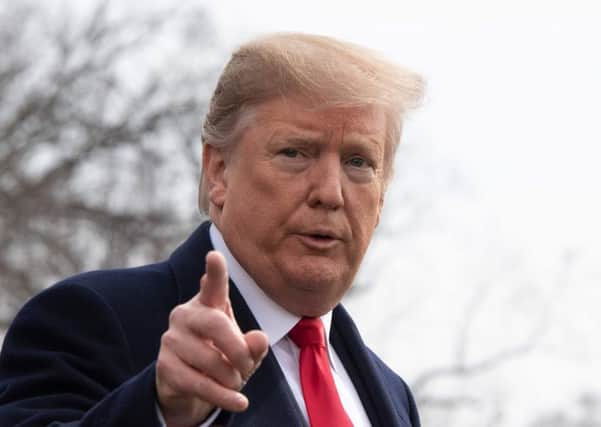Plans to disrupt Donald Trump’s state visit branded ‘mindless idiocy’
This article contains affiliate links. We may earn a small commission on items purchased through this article, but that does not affect our editorial judgement.


Tory former chief whip Lord Jopling said the US president should be allowed to come to Parliament during his visit.
He said the UK’s relationship with the US must not be “soured by boorish and mindless exhibitionism”.
Advertisement
Hide AdAdvertisement
Hide AdLord Jopling said that despite a regrettable shift away from multilateralism, the US remained a close and continuing ally.
“We still have considerable influences with them which we must preserve and develop.”
The former agriculture minister said that despite reservations about the Trump administration’s “unpredictability”, he deplored the approach of those who planned to “hurl insults” at the president when he comes to London.
“I believe it is mindless idiocy to threaten to disrupt the visit of the Queen’s guest when he comes here next month,” he said, to cheers from peers.
Lord Jopling said it was astonishing that people were attempting to prevent Donald Trump coming to Parliament, “this ancient bastion of free speech and generosity to visitors”.
He added: “Surely our vital and continuing need is to continue a warm but objective relationship with our US friends and that must not be soured by boorish and mindless exhibitionism.”
His comments came in debate on the international relations committee’s report on UK foreign policy in a shifting world order.
Its chairman, Tory former Cabinet minister Lord Howell of Guildford said global power had plainly shifted and been redistributed worldwide, demanding “some deep re-thinking about our national strategy”.
Advertisement
Hide AdAdvertisement
Hide AdLord Howell said developments in China and the US had “shaken to the core the assumptions on which our foreign policy has been predicated for the last 70 years”.
He said the change of approach by the US under Donald Trump was “deadly serious” for the UK.
Unlike the US, the UK Government did not see high-tech China as the “number one enemy, although we obviously have to be very cautious”.
Nor did the UK see the nuclear deal with Iran as “something to be pushed aside” or see trade wars as benefiting anybody.
Lord Howell said the digital age challenge came not just from China, adding: “The whole of Asia is on the march.”
He told the Lords: “Our report concludes that to operate effectively in this new environment, we have to combine our military hard power, our technology and our considerable soft power with a new dexterity and agility.”
Tory former chancellor Lord Lamont pointed to the “unilateralism that is now appearing in American policy” and the differing views between London and Washington.
He said: “It is right that when we have differences even with our oldest ally that we express them quite openly.
Advertisement
Hide AdAdvertisement
Hide Ad“What is the value of a long-standing deep friendship if we can’t speak frankly to each other and when we disagree be quite open about it.”
Former UK ambassador to the US Lord Kerr of Kinlochard said agreed with “the need to be courteous when the president comes to London but I do hope that we won’t pull our punches”.
Arguing the relationship had to be based on honesty, he said: “I watched Margaret Thatcher handle Ronald Reagan.
“The reason he so respected her was her insistence on tackling the difficult issues and on plain speaking.”
Lord Bates, who quit as a minister at the Department for International Development (Dfid) last month to walk from Belfast to Brussels in a quest to find “common ground” on Brexit, stressed the need to focus on conflict prevention.
He said: “During my time as a minister in Dfid I was struck that when a military or emergency humanitarian response was required the international community could mobilise with awesome efficiency and release billions of pounds.
“But when conflict prevention initiatives were suggested there was kind of gentle smile and a tilt of the head and we’d begin fumbling down the back of the ministerial sofa for loose change.”
Arguing that the risk of a “great power conflict is probably at its highest for 50 years”, he added: “At the same time it’s becoming more and more difficult to respond effectively through multilateral institutions.
Advertisement
Hide AdAdvertisement
Hide Ad“So our attention must turn to working with others on conflict prevention.
“Peacebuilding, peacekeeping, arbitration, conflict prevention need to become a core competence of UK foreign policy going forward, not an optional add on.”
He said: “We must learn to mobilise for peace where we used to mobilise for war.”
Labour former defence secretary Lord Browne of Ladyton warned that tensions between the West and Russia could escalate into a crisis and “result in either an accidental or deliberate use” of nuclear weapons.
While stressing the need for engagement with Moscow, he said this would not mean ignoring Russian aggression.
Lord Browne said: “My argument is that dialogue is an element of a policy that includes the recognition and rejection of and the deterrence of that sort of behaviour.
“It doesn’t mean giving Russia a free pass.
“Maintaining a meaningful level of contact with our adversaries has always been an imperative for mutual security.
“We understood this during the Cold War.”
He added: “We appear now to be in a downward spiral of confrontation in which dialogue is treated by us as a reward to be earned rather than a diplomatic tool to be deployed.”